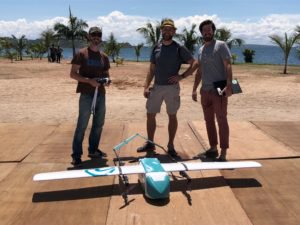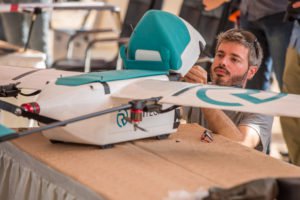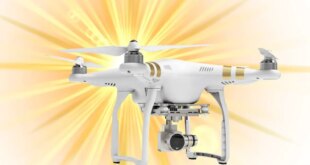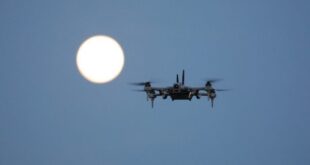DroneLife recently caught up with David Rovira, Co-Founder and COO of Rigi Technologies, manufacturers of a new delivery drone built around the package. (Check out the video below to see Rigi’s unique design.) David tells us about Rigi, where they fit in the delivery marketplace, and some of the challenges of using drones for delivery.
DroneLife: Where did you get the idea for Rigi Tech Drones?
David Rovira: “We have been discussing drone delivery since early 2017, but we were all working in other projects – so this was only a recurrent conversation topic until Adam and Oriol, two of the founders, started doing drone cargo trials and then conversations began to be more serious. We started to have conversations around how to make drone delivery sustainable. The Rigi Technologies concept was born as we realized that we needed to approach the design from the logistics /package delivery side, instead of designing or buying a pretty mapping drone and then trying to make deliveries with it. We needed a flying box that could do both landing and taking off in small spaces – but also flying longer distances.”
DroneLife: How long have your been working on the concept?
David Rovira: “We started discussing on the subject back in 2017, although it was not until the second half of 2018 when we jumped from conversations to actions and we organized a business plan – and established what we wanted to do exactly and how. On the other hand, Oriol had been working on the drone hardware since 2016, and was using it for different humanitarian missions.”
DroneLife: What makes your system different?
David Rovira: “Our approach. We are a logistics focused company, drones are the tool to make deliveries more efficient and to reach places that existent infrastructure can´t – but drone delivery needs to be accessible, cost effective and reliable for it be used and demanded.”

DroneLife: Some companies such as Zipline, are doing delivery for blood and medical supplies. It seems like you are more focused on goods, is that correct?
David Rovira: “We are more focused on sustainability of operations. Zipline has a very interesting niche market and they are great at it, but once you move outside the emergency / lifesaving deliveries you need to find a way of reducing the cost per delivery. One option is volume – the more you deliver the cheaper it gets – so we want to move outside the niche markets and look at broader eCommerce, postal, healthcare and B2B spare part deliveries.”
DroneLife: What stage are you in your development?
David Rovira: “We are still young, the company was only started in September 2018. But today we have a drone system capable of operating, and we have our first clients with whom we are starting to implement the delivery routes.”
DroneLife: Who is the client for your systems? Is it companies, or remote cities and towns?
David Rovira: “We have different types of clients that can even be complementary to each other. If we create an air shuttle route, it can be both used by a Ministry of Health of a country for medicine delivery, but it can also be used by any postal service company, eCommerce company, transporters or even for companies willing to centralize their supply chain and warehousing operations.”
DroneLife: Who will run the drones after they get up and running?
David Rovira: “We can either operate ourselves and hire local staff to proceed with the operations; or have local companies, either existing transporters or startups that want to build their delivery business, directly involved and running the operations.”
DroneLife: What were some of the challenges that you uncovered that you were not expecting?
David Rovira: “I think we are still early stage and we will uncover many more challenges as we walk this road. Maybe I will respond this question in 2020 when I can give you a full list..:)
For now the main challenge has been changing people’s perception of drone delivery from a futuristic cool technology to a reality that can start having an impact today.”
DroneLife: How is the regulatory environment of various countries affecting you – where are you focusing and why?
David Rovira: “It is a fairly new market. Although drone delivery is a reality in some countries, the implications of drones flying BVLOS over populated areas are important, and it is a great responsibility that only a few countries in perfectly defined environments want to take at the moment. Rigi Technologies want to help regulators by taking a risk assessment approach and concentrating in rural areas. We want to make routes to hard to reach places where we intend to fly as little as possible over urban areas.”
CEO DroneLife.com, DroneRacingLife.com, and CMO of Jobfordrones.com. Principle at Spalding Barker Strategies. Proud father of two. Enjoys karate, Sherlock Holmes, and interesting things. Subscribe to all things drone at DroneLife here.
https://dronelife.com/2019/02/21/dronelife-exclusive-drone-delivery-is-a-reality-that-has-impact-today-an-interview-with-rigi-technologies/
 Unmanned Aerial Vehicle The latest drone news
Unmanned Aerial Vehicle The latest drone news




